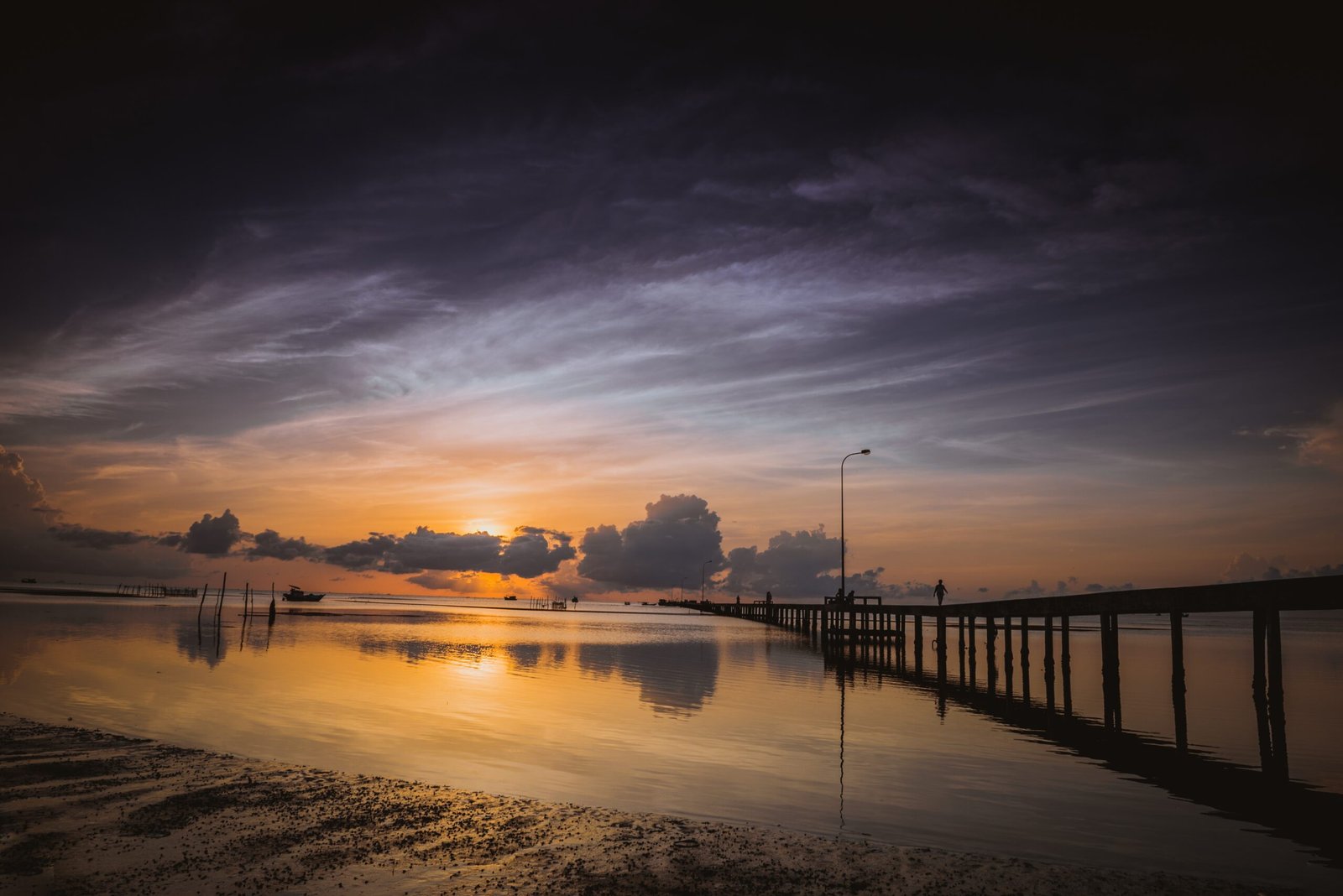Introduction to Phu Quoc
Phu Quoc, an enchanting island located off the coast of Cambodia in the Gulf of Thailand, has steadily risen in prominence as a premier travel destination. Often referred to as Vietnam’s island paradise, Phu Quoc captivates visitors with its pristine beaches, verdant forests, and vibrant cultural tapestry. This idyllic locale, with its unique blend of natural beauty and cultural richness, offers an unparalleled escape for those seeking both relaxation and adventure.
Geographically, Phu Quoc is the largest island in Vietnam, encompassing an array of stunning landscapes. From the sun-kissed shores of Long Beach to the lush greenery of the Phu Quoc National Park, the island’s diverse environments cater to a wide spectrum of interests. Whether you are looking to bask in the sun, explore dense jungles, or dive into crystal-clear waters, Phu Quoc presents an abundance of opportunities to connect with nature.
Beyond its natural allure, Phu Quoc is steeped in cultural heritage. The island is home to various traditional Vietnamese villages, bustling night markets, and historical sites that reflect its rich history. Visitors can immerse themselves in local life, sampling fresh seafood delicacies and experiencing the warm hospitality of the island’s inhabitants. The blend of tradition and modernity is evident throughout Phu Quoc, making it a compelling destination for both cultural enthusiasts and casual tourists.
As tourism continues to grow, Phu Quoc has managed to retain its charm and appeal. Efforts to promote sustainable tourism and preserve the island’s natural and cultural resources are evident, ensuring that Phu Quoc remains a paradise for future generations. This guide aims to delve deeper into the myriad experiences that await on this captivating island, offering insights and tips to make the most of your visit to Phu Quoc, Vietnam.
Top Beaches to Visit
Phu Quoc, Vietnam, is renowned for its stunning beaches, each offering unique experiences and pristine landscapes. Among the most celebrated are Long Beach, Sao Beach, and Ong Lang Beach, each providing visitors with memorable activities and breathtaking views.
Long Beach is arguably the most famous beach in Phu Quoc. Stretching over 20 kilometers, this golden-sand beach is ideal for sunbathing and swimming. The shallow waters make it perfect for families, while the numerous beachfront resorts and bars offer ample opportunities for relaxation and refreshment. The best time to visit Long Beach is in the late afternoon when the sunset casts a golden hue over the entire coastline, creating an idyllic setting for evening strolls.
Sao Beach, located on the southeastern coast, is a must-visit for those seeking tranquility. Known for its powdery white sand and crystal-clear waters, Sao Beach is perfect for snorkeling enthusiasts. The beach is less crowded compared to Long Beach, providing a more serene environment. Early mornings are ideal for visiting Sao Beach to experience the calm waters and avoid the midday heat. There are also several local eateries where visitors can savor fresh seafood while enjoying the stunning coastal views.
Ong Lang Beach offers a more secluded experience. Nestled on the northwestern side of the island, this beach is characterized by its rocky outcrops and lush greenery. Ong Lang Beach is a fantastic spot for both swimming and picnicking, with clear waters and shaded areas. The best time to visit is during the late morning or early afternoon when the sun illuminates the turquoise waters, enhancing the natural beauty of the surroundings. Additionally, the sunsets here are spectacular, providing a perfect backdrop for photography.
Each of these beaches in Phu Quoc, Vietnam, offers a unique blend of natural beauty and recreational activities, ensuring that every visitor can find their perfect spot in this island paradise. Whether you seek adventure or relaxation, the beaches of Phu Quoc have something special to offer.
Exploring Phu Quoc National Park
Phu Quoc National Park is a testament to Vietnam’s commitment to preserving its natural heritage. Encompassing over 31,000 hectares, this protected wilderness is a mosaic of lush forests, rugged mountains, and pristine marine areas. Its vast expanse offers a unique opportunity for visitors to immerse themselves in the unspoiled beauty of Phu Quoc, Vietnam’s largest island.
The park is interwoven with a network of hiking trails that cater to varying levels of fitness and experience. From gentle walks through verdant lowland forests to more challenging treks up the slopes of Mount Chua, the highest peak in the park, there is a route for every adventurer. Along these trails, visitors can encounter a diverse array of wildlife, including the rare and endangered langur monkeys, hornbills, and the elusive Phu Quoc ridgeback dog. Bird watchers, in particular, will find the park a haven, with over 200 species of birds to spot.
Conservation efforts are at the heart of Phu Quoc National Park’s mission. The park plays a crucial role in protecting the island’s unique biodiversity and promoting sustainable tourism. Guided tours are highly recommended for those seeking a deeper understanding of the park’s ecosystems and conservation initiatives. Knowledgeable guides can provide insights into the flora and fauna, as well as the ongoing efforts to preserve this natural sanctuary.
For the best experience, visitors should consider routes such as the Ganh Dau Trail, known for its panoramic views of the ocean and Cambodia in the distance, or the Ham Ninh Trail, which offers a journey through dense forest and past cascading waterfalls. These trails not only showcase the park’s natural beauty but also highlight the importance of preserving such pristine environments for future generations.
Phu Quoc National Park is more than just a destination; it is a reminder of the intrinsic value of nature and the importance of conservation. Whether you are an avid hiker, a wildlife enthusiast, or simply seeking tranquility away from the bustling tourist spots, Phu Quoc National Park promises an unforgettable adventure in the heart of Vietnam’s island paradise.
Cultural and Historical Sites

Phu Quoc, Vietnam, is more than just an island paradise with stunning beaches; it is also a place rich in cultural and historical significance. One of the must-visit sites is the Dinh Cau Night Market. This bustling market offers a glimpse into the local way of life, where visitors can sample an array of traditional Vietnamese street food, purchase unique handicrafts, and experience the vibrant nightlife.
Another key historical attraction is the Phu Quoc Prison Museum, also known as Coconut Tree Prison. This museum provides a sobering look at Vietnam’s turbulent history. Originally built by French colonists and later used during the Vietnam War, the museum offers a poignant reminder of the island’s past struggles. Exhibits include artifacts, photographs, and reconstructed prison cells, making it an educational experience for those interested in Vietnam’s history.
Traditional fishing villages scattered across Phu Quoc offer insights into the island’s enduring maritime culture. Villages such as Ham Ninh and Rach Vem are perfect for observing local fishermen at work, experiencing traditional fishing methods, and understanding the community’s reliance on the sea. These villages also provide opportunities to taste the freshest seafood, often prepared using age-old recipes.
The island’s history is deeply intertwined with its local customs and traditional crafts. Visitors can explore workshops where artisans create items like fish sauce, pepper, and pearl jewelry, which are renowned products of Phu Quoc. These crafts not only represent the island’s economic backbone but also its cultural heritage.
When visiting these cultural and historical sites, it is crucial to show respect for local customs and traditions. Dress modestly, ask for permission before taking photographs, and be mindful of the cultural significance of the places you visit. By doing so, tourists contribute to the preservation of Phu Quoc’s unique heritage while enjoying a deeper, more meaningful travel experience.
Adventure Activities and Water Sports
Phu Quoc, Vietnam, is an adventurer’s paradise, offering a plethora of water sports and activities that cater to thrill-seekers and nature lovers alike. One of the most popular activities on the island is scuba diving. With its crystal-clear waters and diverse marine life, Phu Quoc provides an exceptional diving experience. Reputable operators such as Flipper Diving Club and Rainbow Divers offer guided dives and certification courses. Safety is paramount, so it’s essential to choose operators with certified instructors and well-maintained equipment.
Snorkeling is another fantastic way to explore Phu Quoc’s underwater world. The island boasts vibrant coral reefs teeming with colorful fish and other marine species. For the best snorkeling experience, head to spots like Hon Thom Island and Fingernail Island. Many tour operators offer snorkeling trips, which often include transportation, gear rental, and guides to ensure a safe and enjoyable adventure.
For those who prefer to stay above the water, kayaking is an excellent way to explore Phu Quoc’s stunning coastline and hidden coves. Kayaking tours are available through operators like John’s Tours, which provides all necessary equipment and guidance. Whether paddling through the calm waters of the Cua Can River or exploring the An Thoi Archipelago, kayaking offers a unique vantage point of the island’s natural beauty.
Jet skiing is perfect for adrenaline junkies looking for a high-speed adventure. The island’s calm seas provide ideal conditions for this thrilling activity. Ensure you rent from reputable operators like PQ Water Sports to guarantee well-maintained jet skis and safety briefings. Popular spots for jet skiing include Long Beach and Bai Sao, where the expansive waters allow for exhilarating rides.
Phu Quoc’s vibrant marine life and pristine coral reefs make it a prime destination for water sports enthusiasts. Whether you’re diving beneath the waves, snorkeling in shallow waters, kayaking along the coast, or speeding across the sea on a jet ski, Phu Quoc offers an unforgettable adventure for everyone.
Culinary Delights: What to Eat
Phu Quoc, Vietnam, is not just an island paradise famed for its scenic beauty but also a culinary haven that offers a diverse array of mouth-watering delights. The island’s cuisine is heavily influenced by its coastal location, making seafood a staple in many local dishes. One cannot discuss Phu Quoc’s culinary landscape without highlighting its renowned fish sauce. This pungent yet flavorful condiment is a cornerstone of Vietnamese cuisine and is produced extensively on the island. A visit to Phu Quoc would be incomplete without sampling dishes that incorporate this signature ingredient.
Among the must-try dishes is Bun Quay, a unique noodle soup that stands out for its fresh ingredients and interactive preparation process. Diners often customize their bowls with a medley of herbs, spices, and condiments. Another local specialty is grilled sea urchin, a delicacy that is both sumptuous and rich in nutrients. Often served with a squeeze of lime and a sprinkle of salt, it offers a taste of the ocean in every bite.
Pepper is another culinary highlight of Phu Quoc. The island’s pepper plantations produce some of the finest quality pepper in Vietnam, adding a distinct aroma and flavor to various dishes. Visitors are encouraged to tour these plantations and even purchase some pepper as a culinary souvenir.
For those looking to delve deeper into the local food culture, there are numerous dining spots ranging from bustling street food stalls to elegant fine dining establishments. The night markets, such as Dinh Cau Night Market, are ideal for sampling a variety of street foods like grilled seafood, savory pancakes, and tropical fruits. Meanwhile, establishments like the Mango Bay Restaurant offer a refined dining experience with a menu that highlights the island’s freshest ingredients.
To fully experience the culinary offerings of Phu Quoc, it is advisable to venture beyond the popular tourist areas. Engage with local vendors and don’t hesitate to try new and unfamiliar dishes. This approach not only enriches your palate but also provides a deeper understanding of the island’s rich food culture.
Accommodation Options
Phu Quoc, Vietnam offers a diverse range of accommodation options tailored to suit different budgets and preferences. From luxurious resorts to charming beachfront bungalows and eco-friendly lodges, visitors can find the perfect place to stay on this beautiful island.
For those seeking opulence and top-tier amenities, luxury resorts in Phu Quoc provide an unparalleled experience. Vinpearl Resort & Spa is a prime example, boasting lavish rooms, private beaches, and world-class facilities. Another notable mention is JW Marriott Phu Quoc Emerald Bay Resort & Spa, renowned for its unique design and exceptional service. These resorts often feature multiple dining options, spa services, and easy access to major attractions, ensuring a pampered stay.
Travelers on a budget will find plenty of affordable yet comfortable hotels scattered across Phu Quoc. The 9 Station Hostel, for instance, offers clean and modern dormitory-style accommodations, perfect for backpackers and solo travelers. For a bit more privacy without breaking the bank, the Lahaina Resort provides cozy rooms with beautiful garden views and a convenient location near Duong Dong Town, the capital of Phu Quoc.
Unique stays are also a highlight of Phu Quoc. Beachfront bungalows provide an intimate and scenic retreat, with places like Coco Palm Beach Resort & Spa offering charming wooden bungalows right by the sea. For eco-conscious travelers, Mango Bay Resort stands out with its commitment to sustainability, featuring eco-friendly lodges nestled in a tranquil natural setting.
When choosing accommodation in Phu Quoc, consider the location and proximity to major attractions. Staying in Duong Dong Town offers easy access to night markets, restaurants, and the vibrant local culture. For a more secluded experience, the northern and southern parts of the island provide serene beaches and lush landscapes, perfect for a relaxing getaway.
Practical Tips for Visiting Phu Quoc
When planning a trip to Phu Quoc, Vietnam, timing is key. The best time to visit is during the dry season, from November to March, when the weather is pleasant, and rainfall is minimal. This period is ideal for exploring the island’s stunning beaches and engaging in outdoor activities.
Getting to Phu Quoc is quite convenient. The island is accessible via flights from major cities like Hanoi and Ho Chi Minh City, with the Phu Quoc International Airport serving as the primary gateway. Alternatively, travelers can opt for a ferry from the mainland, departing from Ha Tien or Rach Gia. Once on the island, transportation options include taxis, motorbikes, and bicycles, which are readily available for rent.
Travelers should be aware of Vietnam’s visa requirements. Citizens from several countries, including the United States, the United Kingdom, and Australia, can apply for an e-visa online. Additionally, Phu Quoc offers a visa exemption for visitors staying less than 30 days, provided they enter and exit through the island’s designated entry points.
Health and safety are paramount while visiting Phu Quoc. It’s advisable to have travel insurance that covers medical expenses. Ensure vaccinations for common diseases like hepatitis A and B, typhoid, and tetanus are up to date. Drinking bottled water is recommended to avoid potential health issues, and it’s wise to carry a basic first aid kit.
The local currency is the Vietnamese Dong (VND), and it’s useful to have some cash on hand for small purchases, as not all establishments accept credit cards. English is not widely spoken, so learning a few basic Vietnamese phrases can be beneficial. Phu Quoc’s culture emphasizes respect and politeness; dresses modestly when visiting religious sites and always asks for permission before taking photographs of locals.
By keeping these practical tips in mind, travelers can ensure a smooth and enjoyable experience while exploring the charming island of Phu Quoc, Vietnam.




